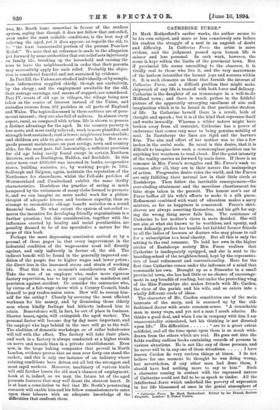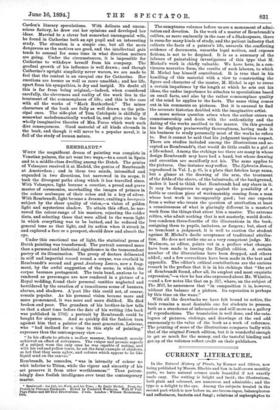CATHERINE .t URZE.*
IN Mark Rutherford's earlier works, the author seems to be his own subject, and more or less consciously sets before his readers the struggle of a soul in an anguish of doubt and difficulty. In Catherine Furze the artist is more evident, and the judgment passed upon human life is calmer and less personal. In each work, however, the scene is kept within the limits of the provincial town. But if provincial life seems unexalting to the observer, it is vividly real to those who live it, and the very narrowness of the horizon intensifies the human joys and sorrows within it. It is such elements as these that furnish the interest of Catherine Furze, and a difficult problem that might make shipwreck of any life is treated with both force and delicacy. Catherine is the daughter of an ironmonger in a well-to-do Midland town ; and there is much pathos in the faithful picture of the apparently unvarying smallness of aim and imagination which is to be found in that particular stratum of life. In Catherine herself there is a revolt, both of thought and speech ; but it is of the kind that represses itself and works inwardly. Whereas a wilder nature might have broken away from all restraint, Catherine has a power of endurance that comes very near to being genuine nobility of soul. In Eastshorpe the lines are rigid and the barriers firm. The aim and effort of her mother was to rise a few inches in the social scale. So usual is this desire, that it is difficult to imagine how such a commonplace position can be anything but weariness to read about. But the quiet intensity of the reality carries us forward by main force. If there is no romance in Mrs. Furze's struggles and Mr. Furze's weak re- sistance after all, they are in their nature the mainsprings of action. Progressive desire rules the world, and the Fames are only fulfilling their natural law in their little circle at Eastahorpe. Then follow the inevitable consequences—the ever-eluding attainment and the merciless chastisement for false steps taken in the pursuit. The honest sow's ear of Furze baffles all his wife's efforts to make it a silk purse. Refinement combined with want of education makes a sorry mixture, as far as happiness is concerned. Furze's shirt- sleeves are always asserting themselves, and his gift for say- ing the wrong thing never fails him. The resistance of Catherine to her mother's views is more decided. She will not aimat what she knows to be worthless, and openly, and even defiantly, prefers her humble but faithful farmer friends to all the ladies of brewers or doctors who may please to call for a subscription to a local charity. But all this is only the setting to the real romance. To hold her own in the higher circles of Eastshorpe society Mrs. Furze realises that Catherine is inadequately equipped, and she is sent to the boarding-school of the neighbourhood, kept by the representa- tive of local refinement and conventionality. Here for the first time Catherine comes under the influence of a mind that commands her own. Brought up as a Dissenter in a small provincial town, she has had little or no chance of encourage- ment in any breadth of reading, but under the protecting wing of the Miss Ponsonbys she makes friends with Mr. Carden, the vicar of the parish, and his wife, and so enters into a. wholly different circle of ideas.
The character of Mr. Carden constitutes one of the main interests of the story, and is summed up by the old- fashioned doctor with acute common-sense. "A remarkable man in many ways, and yet not a man I much admire. He thinks a good deal, and when I am in company with him I am unaccountably stimulated, but his thinking is not directed upon life." His difficulties "are to a great extent artificial, and all the time spent upon them is so much with- drawn from the others which are real. He goes out into the fields reading endless books containing records of persona in various situations. He is not like any of those persons, and he never will be in any one of those situations I have known Carden do very curious things at times. I do not believe for one moment he thought he was doing wrong, but nevertheless, if any other man had done them, I should have had nothing more to say to him." Such a character coming in contact with the repressed nature of Catherine could not fail to be as spark to tinder. All the intellectual .force which underlaid the poverty of expression in her life blossomed at once in the genial atmosphere of
• Catherine Furze. By Mark Rutherford. Edited by his Friend. Reuben Bhapoott. London T. Fisher
Carden's literary speoulations. With delicate and uncon- scious flattery, he drew out her opinions and developed her ideas. Married to a clever but somewhat uncongenial wife, he found in Catherine both an apt pupil and an interesting study. The situation is a simple one, but all the more dangerous as the motives are good, and the intellectual gain tends to conceal for some time in what direation matters are going. Under the circumstances, it is impossible for Catherine to withdraw herself from his company. The gradual growth of his influence is well drawn ; and though Catherine's upright simplicity never wavers, we are made to feel that the contest is an unequal one for Catherine. Her emotions are keener as well as more unselfish; and her life, apart from his sympathies, is dry and insipid. No doubt all this is far from • being origina,1,—indeed, when considered carefully, the cleverness and reality of the work lies in the treatment of the commonplaces of life; and this is the case with all the works of "Mark Rutherford." The minor characters of the book are fully as well drawn as the prin- cipal ones. The side-plot of Tom Catchpole is skilfully if somewhat melodramatically worked in, and gives rise to the wholly imaginative theories of Mrs. Furze which work such dire consequences. Good material of all kinds abounds in the book, and though it will never be a popular novel, it is fall of the study of human nature.



































 Previous page
Previous page